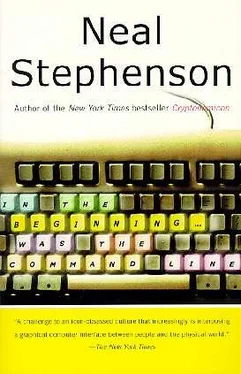Neal Stephenson - In the Beginning was the Command Line
Здесь есть возможность читать онлайн «Neal Stephenson - In the Beginning was the Command Line» весь текст электронной книги совершенно бесплатно (целиком полную версию без сокращений). В некоторых случаях можно слушать аудио, скачать через торрент в формате fb2 и присутствует краткое содержание. Жанр: Фантастика и фэнтези, на английском языке. Описание произведения, (предисловие) а так же отзывы посетителей доступны на портале библиотеки ЛибКат.
- Название:In the Beginning was the Command Line
- Автор:
- Жанр:
- Год:неизвестен
- ISBN:нет данных
- Рейтинг книги:5 / 5. Голосов: 1
-
Избранное:Добавить в избранное
- Отзывы:
-
Ваша оценка:
- 100
- 1
- 2
- 3
- 4
- 5
In the Beginning was the Command Line: краткое содержание, описание и аннотация
Предлагаем к чтению аннотацию, описание, краткое содержание или предисловие (зависит от того, что написал сам автор книги «In the Beginning was the Command Line»). Если вы не нашли необходимую информацию о книге — напишите в комментариях, мы постараемся отыскать её.
In the Beginning was the Command Line — читать онлайн бесплатно полную книгу (весь текст) целиком
Ниже представлен текст книги, разбитый по страницам. Система сохранения места последней прочитанной страницы, позволяет с удобством читать онлайн бесплатно книгу «In the Beginning was the Command Line», без необходимости каждый раз заново искать на чём Вы остановились. Поставьте закладку, и сможете в любой момент перейти на страницу, на которой закончили чтение.
Интервал:
Закладка:
The problem is that once you have done away with the ability to make judgments as to right and wrong, true and false, etc., there's no real culture left. All that remains is clog dancing and macrame. The ability to make judgments, to believe things, is the entire it point of having a culture. I think this is why guys with machine guns sometimes pop up in places like Luxor, and begin pumping bullets into Westerners. They perfectly understand the lesson of McCoy Air Force Base. When their sons come home wearing Chicago Bulls caps with the bills turned sideways, the dads go out of their minds.
The global anti-culture that has been conveyed into every cranny of the world by television is a culture unto itself, and by the standards of great and ancient cultures like Islam and France, it seems grossly inferior, at least at first. The only good thing you can say about it is that it makes world wars and Holocausts less likely--and that is actually a pretty good thing!
The only real problem is that anyone who has no culture, other than this global monoculture, is completely screwed. Anyone who grows up watching TV, never sees any religion or philosophy, is raised in an atmosphere of moral relativism, learns about civics from watching bimbo eruptions on network TV news, and attends a university where postmodernists vie to outdo each other in demolishing traditional notions of truth and quality, is going to come out into the world as one pretty feckless human being. And--again--perhaps the goal of all this is to make us feckless so we won't nuke each other.
On the other hand, if you are raised within some specific culture, you end up with a basic set of tools that you can use to think about and understand the world. You might use those tools to reject the culture you were raised in, but at least you've got some tools.
In this country, the people who run things--who populate major law firms and corporate boards--understand all of this at some level. They pay lip service to multiculturalism and diversity and non-judgmentalness, but they don't raise their own children that way. I have highly educated, technically sophisticated friends who have moved to small towns in Iowa to live and raise their children, and there are Hasidic Jewish enclaves in New York where large numbers of kids are being brought up according to traditional beliefs. Any suburban community might be thought of as a place where people who hold certain (mostly implicit) beliefs go to live among others who think the same way.
And not only do these people feel some responsibility to their own children, but to the country as a whole. Some of the upper class are vile and cynical, of course, but many spend at least part of their time fretting about what direction the country is going in, and what responsibilities they have. And so issues that are important to book-reading intellectuals, such as global environmental collapse, eventually percolate through the porous buffer of mass culture and show up as ancient Hindu ruins in Orlando.
You may be asking: what the hell does all this have to do with operating systems? As I've explained, there is no way to explain the domination of the OS market by Apple/Microsoft without looking to cultural explanations, and so I can't get anywhere, in this essay, without first letting you know where I'm coming from vis-a-vis contemporary culture.
Contemporary culture is a two-tiered system, like the Morlocks and the Eloi in H.G. Wells's The Time Machine, except that it's been turned upside down. In The Time Machine the Eloi were an effete upper class, supported by lots of subterranean Morlocks who kept the technological wheels turning. But in our world it's the other way round. The Morlocks are in the minority, and they are running the show, because they understand how everything works. The much more numerous Eloi learn everything they know from being steeped from birth in electronic media directed and controlled by book-reading Morlocks. So many ignorant people could be dangerous if they got pointed in the wrong direction, and so we've evolved a popular culture that is (a) almost unbelievably infectious and (b) neuters every person who gets infected by it, by rendering them unwilling to make judgments and incapable of taking stands.
Morlocks, who have the energy and intelligence to comprehend details, go out and master complex subjects and produce Disney-like Sensorial Interfaces so that Eloi can get the gist without having to strain their minds or endure boredom. Those Morlocks will go to India and tediously explore a hundred ruins, then come home and built sanitary bug-free versions: highlight films, as it were. This costs a lot, because Morlocks insist on good coffee and first-class airline tickets, but that's no problem because Eloi like to be dazzled and will gladly pay for it all.
Now I realize that most of this probably sounds snide and bitter to the point of absurdity: your basic snotty intellectual throwing a tantrum about those unlettered philistines. As if I were a self-styled Moses, coming down from the mountain all alone, carrying the stone tablets bearing the Ten Commandments carved in immutable stone--the original command-line interface--and blowing his stack at the weak, unenlightened Hebrews worshipping images. Not only that, but it sounds like I'm pumping some sort of conspiracy theory.
But that is not where I'm going with this. The situation I describe, here, could be bad, but doesn't have to be bad and isn't necessarily bad now: It simply is the case that we are way too busy, nowadays, to comprehend everything in detail. And it's better to comprehend it dimly, through an interface, than not at all. Better for ten million Eloi to go on the Kilimanjaro Safari at Disney World than for a thousand cardiovascular surgeons and mutual fund managers to go on "real" ones in Kenya. The boundary between these two classes is more porous than I've made it sound. I'm always running into regular dudes--construction workers, auto mechanics, taxi drivers, galoots in general--who were largely aliterate until something made it necessary for them to become readers and start actually thinking about things. Perhaps they had to come to grips with alcoholism, perhaps they got sent to jail, or came down with a disease, or suffered a crisis in religious faith, or simply got bored. Such people can get up to speed on particular subjects quite rapidly. Sometimes their lack of a broad education makes them over-apt to go off on intellectual wild goose chases, but, hey, at least a wild goose chase gives you some exercise. The spectre of a polity controlled by the fads and whims of voters who actually believe that there are significant differences between Bud Lite and Miller Lite, and who think that professional wrestling is for real, is naturally alarming to people who don't. But then countries controlled via the command-line interface, as it were, by double-domed intellectuals, be they religious or secular, are generally miserable places to live. Sophisticated people deride Disneyesque entertainments as pat and saccharine, but, hey, if the result of that is to instill basically warm and sympathetic reflexes, at a preverbal level, into hundreds of millions of unlettered media-steepers, then how bad can it be? We killed a lobster in our kitchen last night and my daughter cried for an hour. The Japanese, who used to be just about the fiercest people on earth, have become infatuated with cuddly adorable cartoon characters. My own family--the people I know best--is divided about evenly between people who will probably read this essay and people who almost certainly won't, and I can't say for sure that one group is necessarily warmer, happier, or better-adjusted than the other.
MORLOCKS AND ELOI AT THE KEYBOARD
Back in the days of the command-line interface, users were all Morlocks who had to convert their thoughts into alphanumeric symbols and type them in, a grindingly tedious process that stripped away all ambiguity, laid bare all hidden assumptions, and cruelly punished laziness and imprecision. Then the interface-makers went to work on their GUIs, and introduced a new semiotic layer between people and machines. People who use such systems have abdicated the responsibility, and surrendered the power, of sending bits directly to the chip that's doing the arithmetic, and handed that responsibility and power over to the OS. This is tempting because giving clear instructions, to anyone or anything, is difficult. We cannot do it without thinking, and depending on the complexity of the situation, we may have to think hard about abstract things, and consider any number of ramifications, in order to do a good job of it. For most of us, this is hard work. We want things to be easier. How badly we want it can be measured by the size of Bill Gates's fortune.
Читать дальшеИнтервал:
Закладка:
Похожие книги на «In the Beginning was the Command Line»
Представляем Вашему вниманию похожие книги на «In the Beginning was the Command Line» списком для выбора. Мы отобрали схожую по названию и смыслу литературу в надежде предоставить читателям больше вариантов отыскать новые, интересные, ещё непрочитанные произведения.
Обсуждение, отзывы о книге «In the Beginning was the Command Line» и просто собственные мнения читателей. Оставьте ваши комментарии, напишите, что Вы думаете о произведении, его смысле или главных героях. Укажите что конкретно понравилось, а что нет, и почему Вы так считаете.








